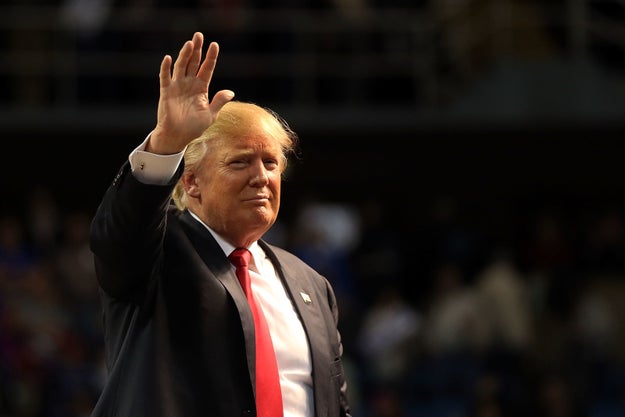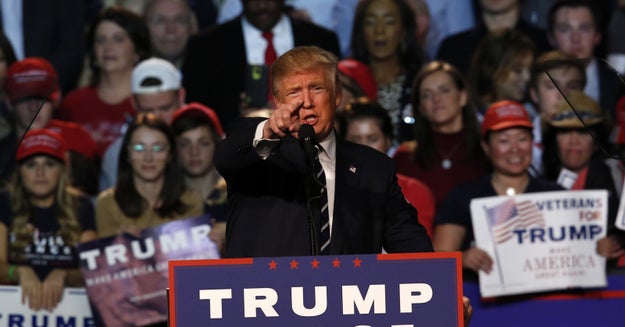Silicon Valley Engineers Pledge To Never Build A Muslim Registry

Spencer Platt / Getty Images
A group of nearly 60 employees at major tech companies have signed a pledge refusing to help build a Muslim registry. The pledge states that signatories will advocate within their companies to minimize collection and retention of data that could enable ethnic or religious targeting under the Trump administration, to fight any unethical or illegal misuse of data, and to resign from their positions rather than comply.
The group describes themselves as “engineers, designers, business executives, and others whose jobs include managing or processing data about people.”
Silicon Valley tech companies themselves have, for the most part, stayed silent or declined to comment when asked about similar commitments to upholding civil rights. The pledge, which is posted at Neveragain.tech, comes a day before top executives at major tech companies plan to attend a summit hosted at Trump Tower in Manhattan. Recode reported that Apple CEO Tim Cook, Facebook COO Sheryl Sandberg, Google CEO Larry Page, Tesla and SpaceX CEO Elon Musk, Microsoft CEO Satya Nadella, and perhaps Amazon CEO Jeff Bezos accepted an invitation to the summit from President-Elect Donald Trump.
Ka-Ping Yee, a software engineer at Wave, formerly of Google, and Leigh Honeywell, a security engineering manager at Slack, helped organize the Never Again pledge. Yee told BuzzFeed News that he didn't know why tech companies have not made similar commitments. “What&039;s important to me is that individuals who care about the ethical use of technology can step forward, show how many of us there are, and say that there are lines we will not cross,” said Yee.
Last month, after Facebook CEO Mark Zuckerberg said it was “pretty crazy” to think that fake news could have affected the presidential election, a group of renegade Facebook employees formed an unofficial task force to investigate Facebook&039;s role in promoting propaganda.
“Ultimately, it&039;s individuals who make decisions and do the work, and can take personal responsibility for their choices; if enough individuals refuse to participate, unethical projects can&039;t proceed,” Yee added.
The pledge says:
We, the undersigned, are employees of tech organizations and companies based in the United States. We are engineers, designers, business executives, and others whose jobs include managing or processing data about people. We are choosing to stand in solidarity with Muslim Americans, immigrants, and all people whose lives and livelihoods are threatened by the incoming administration’s proposed data collection policies. We refuse to build a database of people based on their Constitutionally-protected religious beliefs. We refuse to facilitate mass deportations of people the government believes to be undesirable.
We have educated ourselves on the history of threats like these, and on the roles that technology and technologists played in carrying them out. We see how IBM collaborated to digitize and streamline the Holocaust, contributing to the deaths of six million Jews and millions of others …
Honeywell said that the idea for a pledge came out of “informal discussions among techie friends.” Roughly 30 people collaborated on the text. “We reached out to some civil society groups for feedback – we didn’t want it to be written in a vacuum,” she said. The organizers then looked within their existing networks to enlist others.
Right now within tech companies “there’s a lot of conversation happening about what people’s ethical lines are,” Honeywell told BuzzFeed. “I think that’s really important. We don’t know what’s ahead, but we can at least lay down some ethical boundaries for our own behavior, and hopefully encourage others to do the same.”
As part of the pledge, the signatories have committed to the following actions:
-
We refuse to participate in the creation of databases of identifying information for the United States government to target individuals based on race, religion, or national origin.
-
We will advocate within our organizations:
-
-
to minimize the collection and retention of data that would facilitate ethnic or religious targeting.
-
to scale back existing datasets with unnecessary racial, ethnic, and national origin data.
-
to responsibly destroy high-risk datasets and backups.
-
to implement security and privacy best practices, in particular, for end-to-end encryption to be the default wherever possible.
-
to demand appropriate legal process should the government request that we turn over user data collected by our organization, even in small amounts.
-
-
If we discover misuse of data that we consider illegal or unethical in our organizations:
-
-
We will work with our colleagues and leaders to correct it.
-
If we cannot stop these practices, we will exercise our rights and responsibilities to speak out publicly and engage in responsible whistleblowing without endangering users.
-
If we have the authority to do so, we will use all available legal defenses to stop these practices.
-
If we do not have such authority, and our organizations force us to engage in such misuse, we will resign from our positions rather than comply.
-
- We will raise awareness and ask critical questions about the responsible and fair use of data and algorithms beyond our organization and our industry.”
Quelle: <a href="Silicon Valley Engineers Pledge To Never Build A Muslim Registry“>BuzzFeed










